|
|
|
Sort Order |
|
|
|
Items / Page
|
|
|
|
|
|
|
| Srl | Item |
| 1 |
ID:
130877
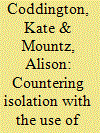

|
|
|
|
|
| Publication |
2014.
|
| Summary/Abstract |
Governments detain asylum seekers on islands across the Indian Ocean region, including Australia's Christmas Island, Papua New Guinea's Manus Island, Nauru, and across the Indonesian archipelago. Scholars and advocates alike have shown that the ambiguous jurisdiction and complex legal migration statuses that emerge in these areas, as well as their remote location and isolation, contribute to their popularity as sites of migrant detention. The negative effects of isolation and remoteness on migrants' physical and mental health, as well as their legal outcomes, have been well documented. We argue, however, that detainees and others are countering the effects of isolation with the use of technology. Ethnographic research conducted on the islands within Australian and Indonesian migrant detention networks suggests that asylum seekers detained in remote sites across the region are combating the isolation of detention with the use of mobile phones, internet access, and social media networks. They communicate with friends, relatives, legal representatives, advocates, activists, and members of the public beyond prison walls to transmit information, facilitate advocacy inside and outside of detention facilities, and construct transnational support networks. In turn, punitive policies to discipline asylum seekers by limiting methods of communication threaten these efforts.
|
|
|
|
|
|
|
|
|
|
|
|
|
|
|
|
| 2 |
ID:
130875


|
|
|
|
|
| Publication |
2014.
|
| Summary/Abstract |
The fisheries statistics systems of many countries are performing poorly, often failing to report on small-scale catches, particularly from subsistence and recreational fisheries. These deficiencies, which lead to the underestimation of catches, are particularly evident in overseas territories of developed countries. This study is an attempt to remedy this for the years 1950-2010 for the Australia Indian Ocean Territories, an area from which little reporting is done. The results suggest that the Cocos (Keeling) Islands had a catch of approximately 80 t·year?1 in the 1950s (essentially subsistence based), which increased, starting in the mid-1980s to reach 250 t·year?1 in recent years, mainly due to the introduction of recreational and later commercial fishing, with signs of overexploitation since 2000. The coastal catch from Christmas Island was tentatively assessed as being higher (40-70 t·year?1) in the 1950s and 1960s than in the 2000s (<30 t·year?1). Fisheries managers in these areas should focus on determining primary target species and their vulnerability to overfishing, as well as developing island specific recreational fishing management plans.
|
|
|
|
|
|
|
|
|
|
|
|
|
|
|
|
| 3 |
ID:
130873
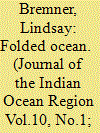

|
|
|
|
|
| Publication |
2014.
|
| Summary/Abstract |
This paper presents experimental research on the Indian Ocean being undertaken within the context of what has been termed architecture's contemporary geographic turn. It investigates how oceanic practices and protocols fold into spatial and architectural products on land, figuring both sea- and land-based logics. It frames this ocean through three tropes: as contact zone, with which are associated ideas of creolisation, transnationalism, entanglement, compaction and multi-polarity; as circulator with which are associated ideas of connectivity, passage, lane, route, choke point, network, port, dock and deposit; and as ecology, with which are associated ideas of liquidity, cycle, rhythm and climate change. The paper introduces these tropes and investigates sites brought into focus through them, highlighting the wider global dynamics or processes they reveal. It concludes with provisional thoughts about what these amphibious sites offer for understandings of architecture and urbanism in today's hyper-articulated, globalised world.
|
|
|
|
|
|
|
|
|
|
|
|
|
|
|
|
| 4 |
ID:
130876
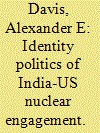

|
|
|
|
|
| Publication |
2014.
|
| Summary/Abstract |
Although its precise definition is contested, the concept of the 'Anglosphere' has grown in political discourse in the past decade. Anglospherist authors have defined it as a group of states tied together on the basis of shared tradition, laws, liberty and language. And yet they do not discuss India substantively, placing it firmly on the outside of its hierarchy. Others have argued the concept is based in a racialised, Anglo-Saxon identity. In 2005, Manmohan Singh surprised some domestic observers by emphasising India's positive connections to the 'English-speaking world' while speaking at Oxford University. Shortly after, India announced negotiations on a civil nuclear agreement with the US, leading to similar agreements with Canada, the UK and Australia. This article uses the contemporary India-US nuclear engagement to investigate India's position in relation to the ideational space of the Anglosphere and how this shapes India-Anglosphere relations. It is argued that India's postcolonial scepticism towards this space combined with the inherent anglocentrism in Anglosphere identity discourse limits India-Anglosphere relations while simultaneously animating nuclear engagement.
|
|
|
|
|
|
|
|
|
|
|
|
|
|
|
|
| 5 |
ID:
130878
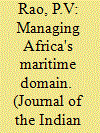

|
|
|
|
|
| Publication |
2014.
|
| Summary/Abstract |
Africa's coastal zones and ocean spaces bear certain unique features as different from those of the other zones of the Indian Ocean region. One such maritime characteristic is that the continent is virtually flanked by sea on all four sides. Such uniqueness of the region has both positive and negative consequences for the coastal countries of Africa. The adverse consequences of the maritime topography, such as piracy and illegal fishing, are rather more seriously felt by today by the regional states. The unstable and fragile political regimes of many of the African littoral countries compound the problems of managing their maritime domains. Maritime criminal and illegal operations are confined not only to the coastal states but also to the island states of the continent. The inability of these states to combat the threats regularly posed by maritime non-state actors has resulted in the enormous naval militarisation of the African waters by foreign naval forces, Western and non-Western. How far and how long the states of the region should depend on foreign countries for ensuring the safety of their coastal zones will also determine the level of independence that these states will retain to keep their maritime wealth and domain under their sovereign control.
|
|
|
|
|
|
|
|
|
|
|
|
|
|
|
|
| 6 |
ID:
130872
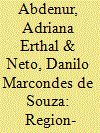

|
|
|
|
|
| Publication |
2014.
|
| Summary/Abstract |
Far from being 'naturally' delineated by geography or bound solely through shared culture, regions are actively constructed by states and other actors pursuing specific interests. In this article, we analyse the region-building efforts of two rising powers - Brazil and India - as they work to project power and enhance their influence within the Atlantic and Indian oceans, respectively. Through a comparison of their behaviours within their maritime spaces - including naval build-up, international cooperation, and efforts to revive institutions such as ZOPACAS and IOR-ARC - we argue that Brazil and India are paying increasing attention to oceanic rims, albeit for somewhat disparate reasons. While India is increasingly concerned with the role of China within the Indian Ocean, for which it has had to rely on US support, Brazil is primarily driven to protect its oil and to minimise the role of the US and NATO in the South Atlantic. In both spaces, however, the rise of so-called non-traditional threats, including piracy, has further motivated these states' maritime power strategies. The analysis suggests that, within the context of the post-Cold War period, rising powers have begun redefining their strategic regions in terms of their maritime perimeters as a way to project power and influence beyond their continental vicinities.
|
|
|
|
|
|
|
|
|
|
|
|
|
|
|
|
| 7 |
ID:
130874


|
|
|
|
|
| Publication |
2014.
|
| Summary/Abstract |
Maritime security in the Indian Ocean Region (IOR) has become a paramount consideration; a range of traditional and non-traditional security challenges largely converge at sea. Risk-based processes offer the potential to engage in a positive, constructive and non-confrontational approach that will help to identify collective and cooperative security strategies. Analysing the evolving maritime security risk context provides a powerful tool for understanding common risks and vulnerabilities that affect regional and extra-regional actors with interests in the IOR. This can provide the impetus for diverse actors, primarily states, to cooperate to advance common objectives and protect shared interests without significantly compromising territorial integrity or sovereignty, against a range of risks that no single actor has the ability to mitigate. Commissioning a multinational, multi-disciplinary team of experts to conduct a regional strategic risk assessment, with a specific focus upon maritime security, should be a priority. Maritime security cooperation in the IOR could, if managed astutely and prudently, bind a diverse and largely disaggregated region
|
|
|
|
|
|
|
|
|
|
|
|
|
|
|
|
|
|
|
|
|